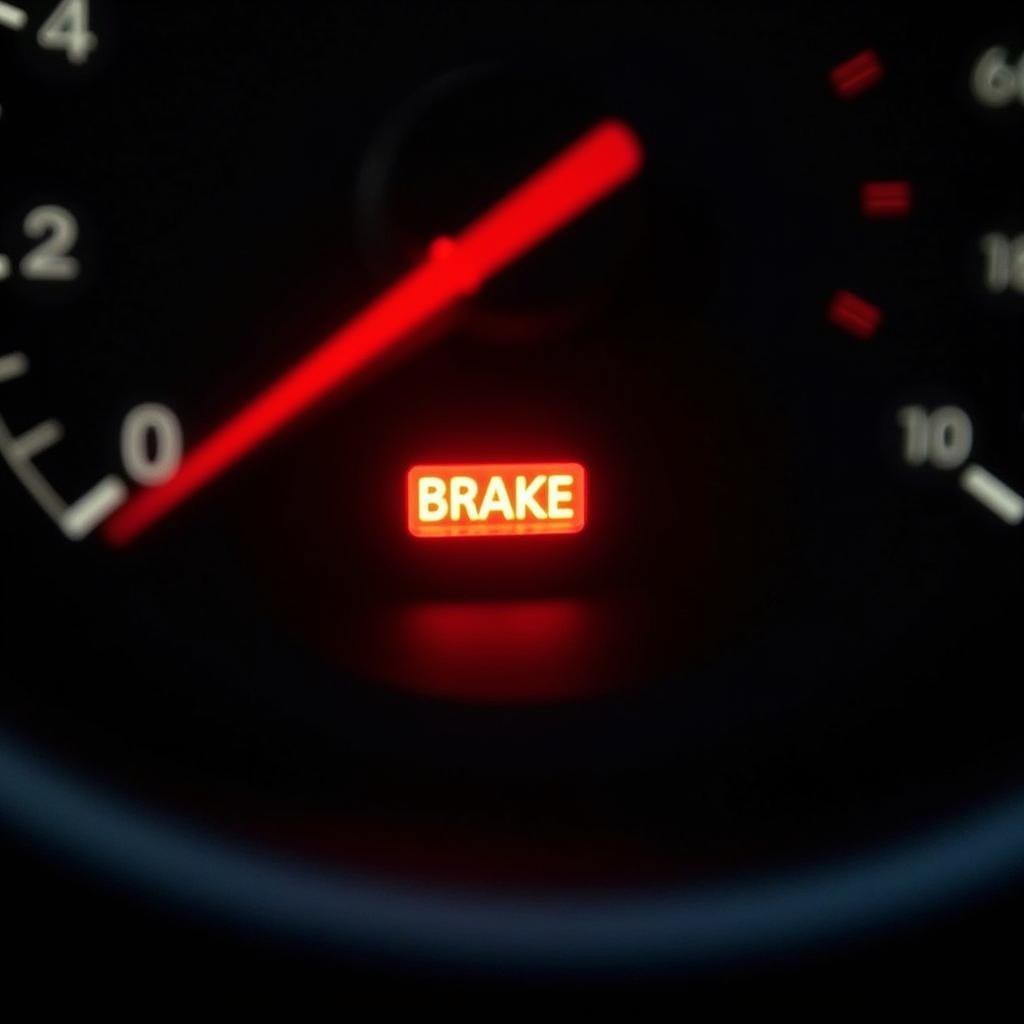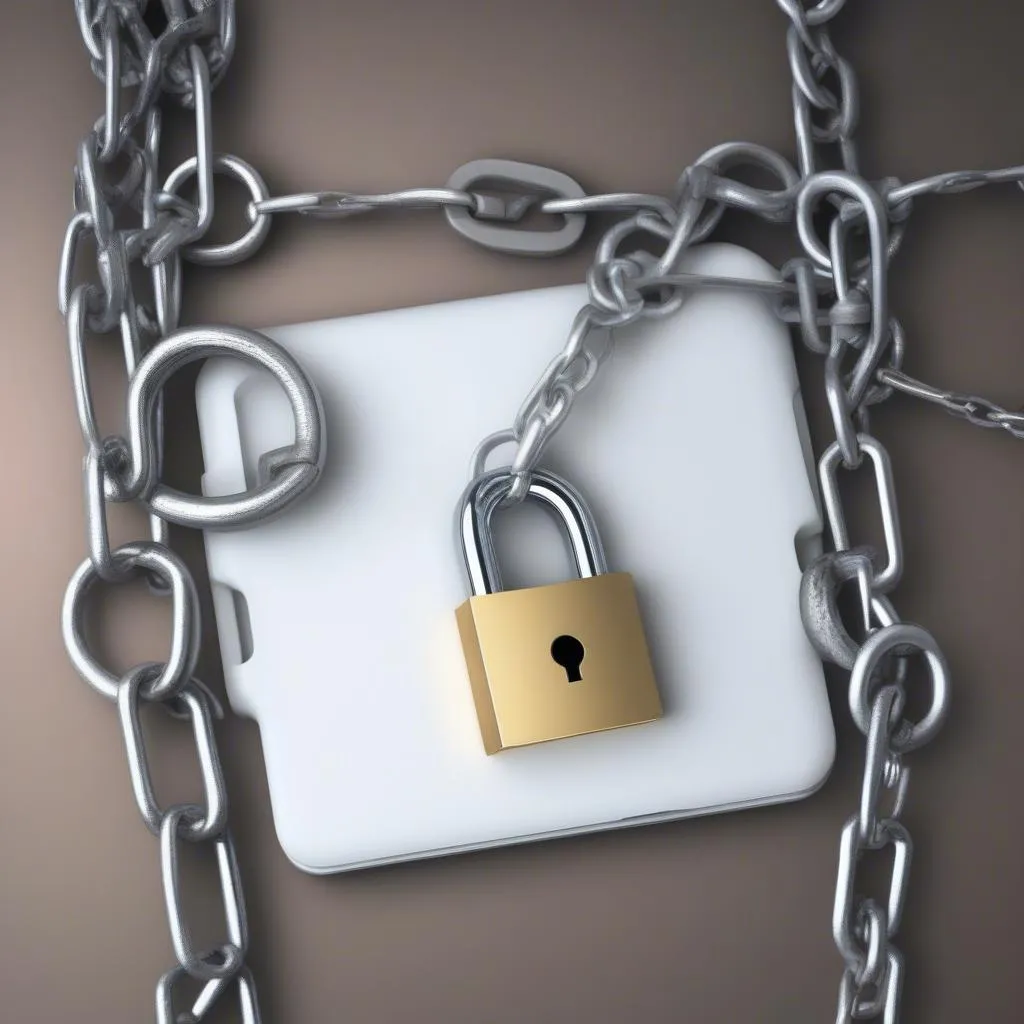A brake warning light illuminating on your dashboard is a clear signal that something isn’t right with your braking system. It’s a warning you should never ignore, as it directly impacts your safety and the safety of others on the road. While it can be unnerving to see this light appear, understanding its various causes and potential solutions can help you address the issue promptly and confidently.
Understanding Your Car’s Brake Warning System
Your car’s brake warning light is part of a sophisticated system designed to alert you to potential problems. When the system detects an issue—whether it’s low brake fluid, a malfunctioning sensor, or a more serious mechanical problem—the warning light on your dashboard will illuminate.
Modern vehicles often employ a two-stage warning system:
- Solid Light: A solid brake warning light usually indicates a problem with your hydraulic brake system or low brake fluid levels.
- Flashing Light: A flashing light often points to a more critical issue with your Anti-lock Braking System (ABS).
 Brake Warning Light on Dashboard
Brake Warning Light on Dashboard
Common Causes of a Brake Warning Light
Several factors can trigger the brake warning light. Let’s delve into some of the most common culprits:
1. Low Brake Fluid
One of the most frequent reasons for the brake warning light to come on is low brake fluid. Brake fluid is the lifeblood of your braking system, transmitting the force from your foot on the brake pedal to the wheels. A leak in the system can lead to a dangerous drop in brake fluid levels.
What to do:
- Check your brake fluid level. Locate the brake fluid reservoir under the hood (refer to your owner’s manual for its exact location).
- Add the correct type of brake fluid if the level is low, but be cautious. If you need to add fluid frequently, it indicates a leak that requires immediate professional attention.
2. Worn Brake Pads
Brake pads are designed to wear down over time. If they wear down too thin, it can trigger the brake warning light. Many vehicles have a sensor in the brake pads that turns on the light when the pads reach a certain level of wear.
What to do:
- Inspect your brake pads. Look for signs of significant wear or if they appear thinner than 1/4 inch.
- Replace worn brake pads. Brake pad replacement is a relatively straightforward job that can often be done at home with basic tools.
3. Faulty Brake Sensor
Your brake system relies on sensors to monitor various components. If a sensor malfunctions, it can send a false signal, triggering the brake warning light even if there’s no actual problem.
What to do:
- Have your brake sensors checked by a mechanic. A professional mechanic can diagnose sensor issues using a specialized scanner.
4. Issues with the ABS System
A problem within your ABS, such as a malfunctioning wheel speed sensor or a faulty ABS module, can also illuminate the brake warning light.
What to do:
- Seek professional diagnosis and repair. ABS systems are complex and require specialized knowledge to diagnose and fix.
5. Emergency Brake is Engaged
It might seem obvious, but sometimes the simplest explanation is the most likely. If you’ve left your parking brake partially engaged, it can cause the brake warning light to stay on.
What to do:
- Fully disengage your parking brake. Ensure the brake lever is completely down.
When to Seek Immediate Attention
If your brake warning light comes on, it’s essential to exercise caution. Here are situations that demand immediate attention:
- Soft or Spongy Brake Pedal: If your brake pedal feels soft or sinks to the floor, it indicates a dangerous loss of brake pressure. Pull over immediately and call for a tow truck.
- Grinding or Squealing Noises: Unusual noises when braking, such as grinding or squealing, often signal worn brake components and require immediate inspection.
- Pulling to One Side: If your car veers to one side when you apply the brakes, it could indicate a serious brake system problem or uneven brake pad wear.
- Burning Smell: A burning smell coming from your wheels, especially after prolonged braking, could indicate severely overheated brakes.
2008 f150 5.4 litre with dash brake warning light on
Remote Diagnostics and Programming: A Modern Solution
In today’s technologically advanced world, remote diagnostics and programming offer a cutting-edge approach to addressing brake warning light issues.
“Remote diagnostics allow us to access a vehicle’s computer system from anywhere in the world,” says automotive electronics expert, David Miller. “This means we can often pinpoint the cause of a brake warning light and provide guidance for repairs without the car ever needing to visit a workshop.”
audi a4 brake warning light on dash
Conclusion
A brake warning light on your dash is a serious matter that should never be ignored. By understanding the common causes and taking appropriate action, you can ensure your safety on the road. Regular brake inspections and maintenance are also essential for preventing problems and ensuring your brakes are always in optimal condition. Remember, when it comes to your brakes, err on the side of caution and seek professional help when needed.
dashboard parking brake warning light
FAQs:
1. Can I drive with the brake warning light on?
It’s strongly discouraged. Driving with a brake warning light on can be extremely dangerous. The issue could worsen, leading to brake failure.
2. How much does it cost to fix a brake warning light?
The cost varies greatly depending on the underlying cause. A simple brake fluid top-up might cost a few dollars, while a complete brake system repair could cost hundreds or even thousands.
3. How often should I get my brakes checked?
It’s generally recommended to have your brakes inspected at least once a year or every 12,000 miles.
2002 ford focus dash warning lights brake
4. Can extreme temperatures affect my brakes?
Yes, extreme heat can cause brake fluid to overheat and lose its effectiveness. Extremely cold temperatures can also impact braking performance.
5. Is it safe to add brake fluid myself?
If you’re comfortable under the hood, you can add brake fluid. However, if you’re unsure or need to add fluid frequently, consult a mechanic as it likely indicates a leak.

